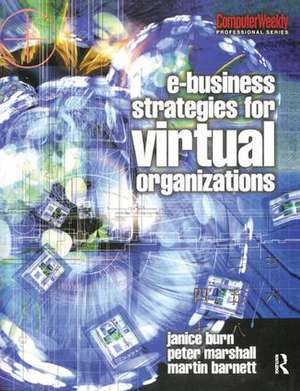e-Business Strategies for Virtual Organizations
Autor Janice Burn, Peter Marshall, Martin Barnetten Limba Engleză Hardback – sep 2016
The authors provide a brief introduction to the concepts and strategic issues surrounding information warfare, managing organizational knowledge, and the information economy. The virtual organization is now an important business model for contemporary business organizations and the flexibility and adaptability of the virtual organization make it ideal for survival in today's highly competitive and dynamically changing markets. Modern corporations may utilize some of the features of the virtual organization to develop the ideal organization to a greater or lesser extent depending on individual business circumstances. This book covers the issues involved in planning, realizing and managing such a virtual organization, and the role of information and communication technologies in supporting virtual organizations and virtual organizing is addressed throughout.
| Toate formatele și edițiile | Preț | Express |
|---|---|---|
| Paperback (1) | 316.24 lei 5-7 săpt. | |
| Taylor & Francis – 12 noi 2001 | 316.24 lei 5-7 săpt. | |
| Hardback (1) | 769.51 lei 6-8 săpt. | |
| Taylor & Francis – sep 2016 | 769.51 lei 6-8 săpt. |
Preț: 769.51 lei
Preț vechi: 1157.71 lei
-34% Nou
Puncte Express: 1154
Preț estimativ în valută:
147.29€ • 160.05$ • 123.81£
147.29€ • 160.05$ • 123.81£
Carte tipărită la comandă
Livrare economică 21 aprilie-05 mai
Preluare comenzi: 021 569.72.76
Specificații
ISBN-13: 9781138151819
ISBN-10: 1138151815
Pagini: 272
Dimensiuni: 189 x 246 mm
Greutate: 0.75 kg
Ediția:1
Editura: Taylor & Francis
Colecția Routledge
Locul publicării:Oxford, United Kingdom
ISBN-10: 1138151815
Pagini: 272
Dimensiuni: 189 x 246 mm
Greutate: 0.75 kg
Ediția:1
Editura: Taylor & Francis
Colecția Routledge
Locul publicării:Oxford, United Kingdom
Public țintă
Professional Practice & DevelopmentCuprins
The nature and rationale of virtual organizations and virtual organizing - Virtual organizations: new rationale for 21st century; Characteristics of the virtual organization; Virtual competition; The role of information and communication technologies in the virtual organization; Strategies for transitioning to the virtual organization - Models of virtual organizations; Virtual value chains; Virtual organizing; Evaluating strategies for change; Management issues in the virtual organization - Virtual re-engineering; virtual teams and outsourcing; Knowledge management in the virtual organization; Virtual cultures; International cases of e-business.
Notă biografică
Janice Burn, Peter Marshall, Martin Barnett
Descriere
'e-Business Strategies for Virtual Organizations' enables IT managers and directors to develop and implement IT strategies and infrastructures for new models of doing business based on the Internet.
The authors provide a brief introduction to the concepts and strategic issues surrounding information warfare, managing organizational knowledge, and the information economy. The virtual organization is now an important business model for contemporary business organizations and the flexibility and adaptability of the virtual organization make it ideal for survival in today's highly competitive and dynamically changing markets. Modern corporations may utilize some of the features of the virtual organization to develop the ideal organization to a greater or lesser extent depending on individual business circumstances. This book covers the issues involved in planning, realizing and managing such a virtual organization, and the role of information and communication technologies in supporting virtual organizations and virtual organizing is addressed throughout.
The authors provide a brief introduction to the concepts and strategic issues surrounding information warfare, managing organizational knowledge, and the information economy. The virtual organization is now an important business model for contemporary business organizations and the flexibility and adaptability of the virtual organization make it ideal for survival in today's highly competitive and dynamically changing markets. Modern corporations may utilize some of the features of the virtual organization to develop the ideal organization to a greater or lesser extent depending on individual business circumstances. This book covers the issues involved in planning, realizing and managing such a virtual organization, and the role of information and communication technologies in supporting virtual organizations and virtual organizing is addressed throughout.










